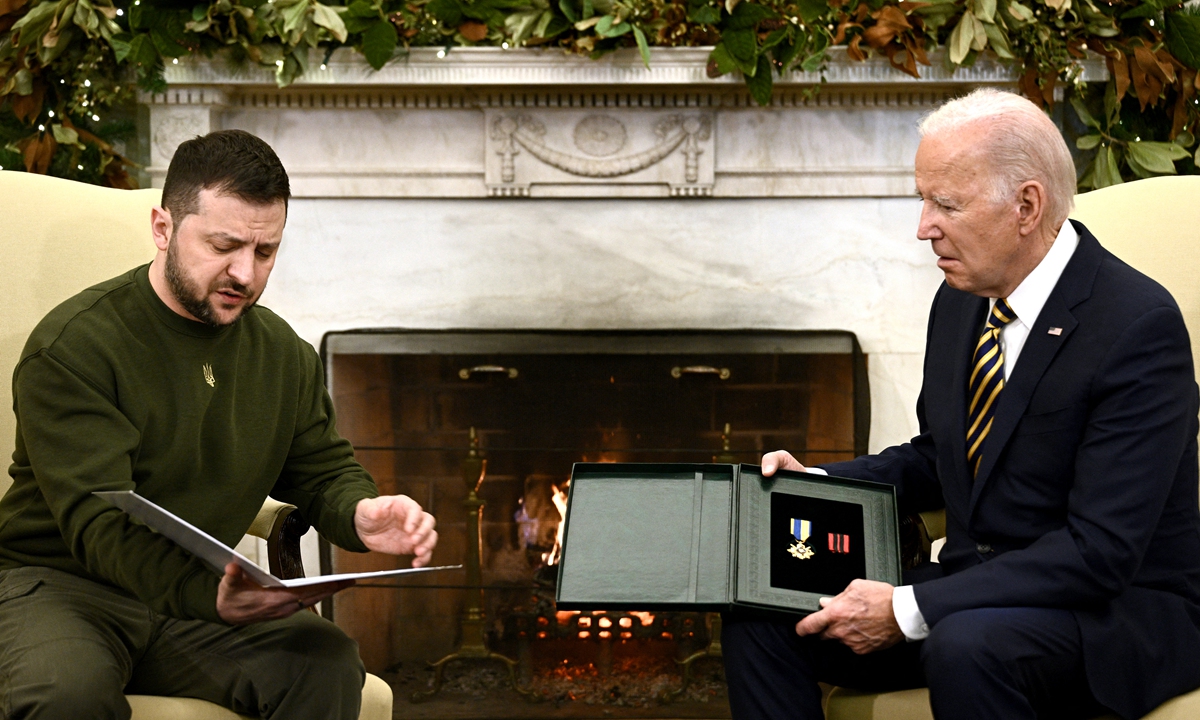
Ukraine's President Volodymyr Zelensky presents a Ukrainian military medal to US President Joe Biden in the Oval Office of the White House, in Washington, DC on December 21, 2022. Photo: AFP
While Washington and Kiev strengthen their united front against Moscow, Russia has to consider increasing its military response to the tighter cooperation between the US and Ukraine. The conflict is bound to become even more brutal, intense, and prolonged as the US increases its support for Ukraine. With the risk of spillover of the Russia-Ukraine military conflict, the world, already in crisis, is unlikely to see peace soon in the new year.
US President Joe Biden welcomed Ukrainian President Volodymyr Zelensky to the White House on Wednesday local time. This is the first known overseas visit of the Ukrainian president since Russia launched its special military operation against the country in February.
Zelensky was reportedly greeted with extended applause from US lawmakers across the aisle when delivering a speech to the US Congress. For many US politicians who want their country to sustain support to Kiev in the attempt to continue exhausting Russia, the Ukrainian leader's visit might be a good Christmas gift.
In many senses, the White House needs such a high-profile event to maintain its advantages in public opinion. As the Republicans are about to take control of the House of Representatives in January, Biden is expected to face more trouble from the GOP, including more uncertainties regarding the Ukraine crisis. Therefore, the Democratic Party has to take the opportunity while it still can to pressure Republicans to keep supporting Ukraine.
Before Zelensky's visit, US Congress on Tuesday proposed an annual spending bill containing up to $45 billion in emergency aid for Ukraine, $8 billion more than the $37 billion President Biden asked Congress for last month. The bill still must be passed by the House and Senate and then signed by the President.
In fact, the Ukrainian leader's short US trip aims to help push for aiding Ukraine in the war, which has met with opposition from Republicans and progressives. In particular, the Biden administration expects Zelensky's speech to Congress will persuade those lawmakers who have concerns to give their vote of approval to pass the Ukraine aid bill.
While still assuming control of the House, the Democrats have tried to make supporting Ukraine a bipartisan policy. In that case, if the future of the military conflict between Moscow and Kiev becomes unfavorable to the US, then the Democratic politicians will not have to take responsibility all by themselves because they have already pressured the GOP to do the same, dragging Republican lawmakers into the mire as well.
And for members of the Republican Party, those who call for reducing US aid to Ukraine remain in the minority. In other words, most high level GOP politicians still support providing military and economic assistance to Ukraine.
In addition, in the eyes of most US politicians, supporting Ukraine is supporting the US itself. That is because if Russia wins, it will further crack the US-dominated global order. As a result, there remains a basic consensus between the two parties on aiding Kiev, and the passage of the bill is very likely.
Zelensky's US trip has continued to send strong signals regarding the war. The message behind the Ukrainian president's remarks is clear: He wants to defeat Russia once and for all.
On the other hand, Washington has emphasized its complete and unconditional support for Kiev and Zelensky. As it frequently claims, it will not hastily end its involvement in the ongoing military conflict simply because it cannot contain Russia. It remains in the US interest to try to destroy Russia as much as possible.
At the same time, by welcoming Zelensky in such a high-profile manner, the US is also reminding its European allies to continue not to give up support to Ukraine despite problems on the continent, including energy crisis, inflation, and possible economic recession.
The day Zelensky arrived in the US was also the 300th day since the beginning of the Russia-Ukraine conflict. Almost one year into the conflict, it seems the chance of the two sides at war sitting down at the negotiating table is still quite slim. As all parties involved are not on the same page on many issues at all, and their demands are too different to coordinate, there is no basis for any kind of peace talks between Russia and Ukraine any time soon.
The article was compiled by the Global Times based on an interview with Song Zhongping, a Chinese military expert and TV commentator. opinion@globaltimes.com.cn




